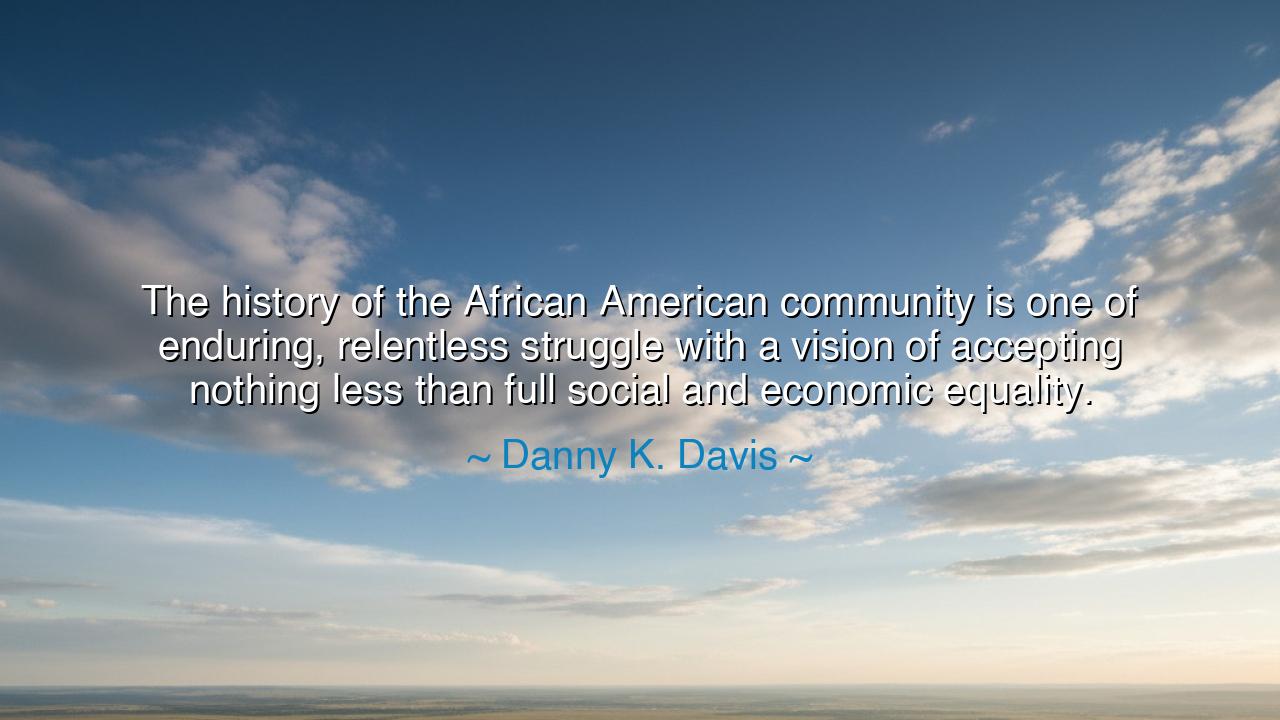
The history of the African American community is one of enduring
The history of the African American community is one of enduring, relentless struggle with a vision of accepting nothing less than full social and economic equality.






"The history of the African American community is one of enduring, relentless struggle with a vision of accepting nothing less than full social and economic equality." These powerful words from Danny K. Davis carry the weight of generations, summoning us to remember the long and storied journey of the African American community. A journey not just of survival, but of an unyielding struggle, driven by the hope of social and economic equality. This struggle is not merely an event in history—it is a living testament to the resilience, determination, and vision of a people who have faced unimaginable adversity, yet never wavered in their demand for justice and equal treatment. The history of African Americans is a tale of hardship, but also of hope, courage, and a refusal to accept anything less than equality.
From the very beginning of the transatlantic slave trade, African Americans were subjected to an existence built upon oppression. The cruel institution of slavery stripped individuals of their humanity, forcing them into lives of unimaginable hardship. But even in these darkest of times, there were those whose hearts were not shackled by the chains that bound their bodies. Consider Frederick Douglass, born into slavery, who managed to escape and become one of the greatest advocates for freedom and equality. Douglass’ life was one of relentless struggle, but also one of vision. His words echoed the call for full social and economic equality, refusing to accept a world where people were judged based on the color of their skin. His belief in the inherent dignity of all people became the foundation for the movement that would eventually reshape the very fabric of American society.
As the years passed and the Civil War ended, African Americans found themselves facing the continuing legacy of racism and discrimination. The promises of freedom and equality made during the war remained unfulfilled for many. In the face of this betrayal, the community rose with a renewed vigor. They knew that the fight was far from over. The Reconstruction era, while filled with hope, also gave rise to fierce resistance from those who sought to maintain the old order. Yet, in the midst of these struggles, figures like W.E.B. Du Bois and Booker T. Washington emerged, providing leadership and vision. They were steadfast in their demand that African Americans be given full social and economic equality, and that nothing less would suffice.
The 20th century was marked by the tireless efforts of civil rights leaders who, like their ancestors, stood firm in their conviction that equality was not a gift to be granted, but a right to be demanded. The civil rights movement, led by giants such as Martin Luther King Jr., Rosa Parks, and John Lewis, brought the struggle for equality to the forefront of the nation’s consciousness. The March on Washington in 1963, where King delivered his iconic "I Have a Dream" speech, was not just a protest—it was a declaration of a vision, a vision of a world where African Americans could live free from oppression, discrimination, and fear. King’s dream of equality was not just for African Americans, but for all people, for the idea that a society built on justice, love, and respect for all is a society worth striving toward.
Yet, even as laws changed and opportunities began to expand, the struggle for full social and economic equality was far from over. The legacy of racism continued to permeate the structures of society. The fight for equality was not simply about access to public spaces or voting booths; it was a fight for economic empowerment, for the ability of African Americans to build wealth, own property, and achieve economic independence. Leaders like Thurgood Marshall, the first African American Supreme Court justice, and Shirley Chisholm, the first African American woman elected to Congress, understood that economic and social equality were deeply intertwined. They worked tirelessly to dismantle the systems of oppression that had kept so many African Americans from achieving the same opportunities as their white counterparts.
Today, the struggle for equality continues. Danny K. Davis' words remind us that the fight for social and economic equality is ongoing. The generations that followed Douglass, King, and Chisholm have inherited the mantle of this struggle, and while progress has been made, the vision of full equality is not yet realized. The Black Lives Matter movement is the latest chapter in this long history of resistance, as it demands justice for those who have been denied it for so long. It is a call to action, to dismantle systemic racism, and to create a world where the promise of equality is a lived reality for every African American.
The lesson of Danny K. Davis’s words is a call to each of us to understand the immense struggle that has led to the freedom we now enjoy. It is a reminder that equality is not a passive ideal but an active battle that requires courage, sacrifice, and a clear vision of the future. We are all, in some way, called to contribute to this struggle—to refuse to accept anything less than a society that honors the dignity and rights of every individual, regardless of their race, gender, or background. As we move forward, let us remember the wisdom of those who have come before us, and let their relentless pursuit of equality guide our steps. The fight for equality is not merely a matter of law; it is a matter of the heart, and it is a fight we must continue until the dream of justice is fully realized for all.






AAdministratorAdministrator
Welcome, honored guests. Please leave a comment, we will respond soon